

Ethnomusicologist Linda O'Brien was in town, Santiago Atitlán, returning after some 35 years to record again the b'iix singers as she had done before back in the day. Vinnie Stanzione and I tagged along – he for his Tzu'tujil linguistic and cultural knowledge, me for..., well I came because I was invited and it seemed likely to be a fun ride. So there we were set up in a concrete block room at guitarist and b'iix singer Cua's family compound. A bedroom recording studio in the grand do-it-now tradition, his daughters sitting giggling on the step. And so Cua with his wrinkled intense, screwed up face laying down his intense chants – songs of travel, for protection, songs to court, to enchant; all of them magical in some deep way – the singer as ajq'ij – shaman - weaving a spell.
And then the idea came like an obsidian bolt cleaving a corn cob: “ Cua is always complaining that people hear his music, take it away and, in his view, he gets nothing back. We will have a digital recording. We have friends with expertise in CD production and design right here. So let's just do it right now! Give him a source of CDs that he can do what he wants with.”
So we took the tracks Linda had recorded of Cua, with him sitting on the edge of his bed – see the photos for the field recording experience. Musician friends Gee Gee and Roberto turned them into something that could be manufactured with a cover beautifully produced by artist Angelika; and we sent it all off to be stamped, pressed, burned or whatever is done to produce CDs nowadays.
And here it is, available. A window on this highland Maya town through which drifts the sounds of a unique, and almost unknown, survival: A combination of Tzu'tujil poetic improv and 16th century Spanish five string guitar with a tuning lost to its homeland. Here in highlands of Guatemala we can hear the echo of a tune reverberating in Mesoamerican space and time.
If this all sounds a bit like the liner notes of a '60s album, from the days when LP covers offered space for the rambling ruminations of range of unlikely note writers from art critics to poets to DJs, then it's probably not a coincidence; for my appreciation of the sheer visceral experience of great musical performance was formed then.
In terms of musical experience, for me, hearing Cua when he's immersed in the world of b'iix, that Mesoamerican dream-weaving of space and time, is in that same league of great stars in the back rooms of London pubs. Like so many musician shamans I've seen conjuring musical magic, from Hendrix in Chislehurst caves, so close one had to sway back to avoid the guitar neck, to the soaring Sufi singer, Nusrat Fateh Ali Khan, in Shoreditch Town Hall, seated on the dusty floor, more or less the lone Anglo in a crowd of Sub-Continental men who would continually troop up to the stage to pin fivers and tenners to his robe as if at some celestial Sub-Continental wedding. This music has that stark quality of deep country rural blues like Robert Johnson at the crossroads. A music that can grab you, make you feel beyond emotion and speak beyond language.
Monday, April 25, 2011